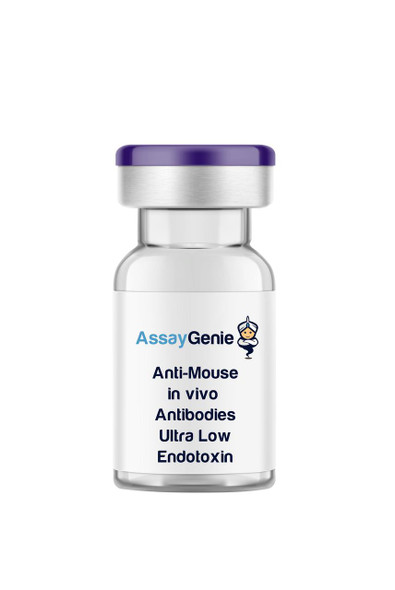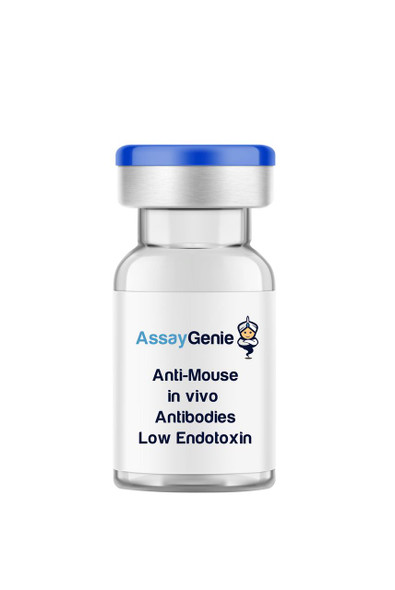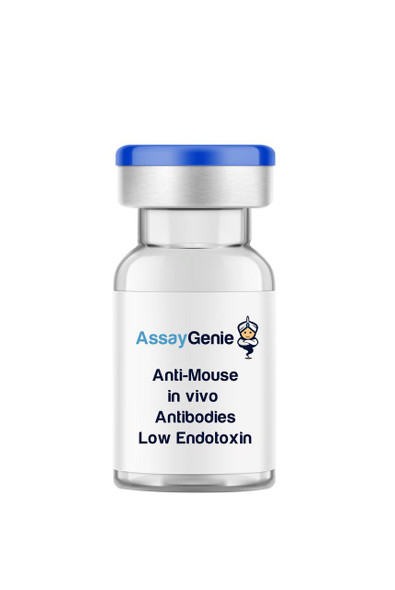Anti-Mouse CD223 (LAG-3) In Vivo Antibody - Low Endotoxin
- SKU:
- IVMB0088
- Product Type:
- In Vivo Monoclonal Antibody
- Clone:
- C9B7W
- Protein:
- CD223
- Isotype:
- Rat IgG1 kappa
- Reactivity:
- Mouse
- Synonyms:
- CD223
- Synonyms:
- LAG3
- Research Area:
- Immune Checkpoint & Cancer Biology
- Endotoxin Level:
- Low Endotoxin
- Host Species:
- Rat
- Applications:
- Blocking
- Applications:
- FA
- Applications:
- IP
- Applications:
- WB
Description
| Product Name: | Anti-Mouse CD223 (LAG-3) In Vivo Antibody - Low Endotoxin |
| Product Code: | IVMB0088 |
| Size: | 1mg, 5mg, 25mg, 50mg, 100mg |
| Clone: | C9B7W |
| Protein: | CD223 |
| Product Type: | Monoclonal Antibody |
| Synonyms: | CD223, LAG3 |
| Isotype: | Rat IgG1 κ |
| Reactivity: | Mouse |
| Immunogen: | Murine CD223-Ig fusion protein |
| Applications: | B, FA, IP, WB |
| Formulation: | This monoclonal antibody is aseptically packaged and formulated in 0.01 M phosphate buffered saline (150 mM NaCl) PBS pH 7.2 - 7.4 with no carrier protein, potassium, calcium or preservatives added. |
| Endotoxin Level: | < 1.0 EU/mg as determined by the LAL method |
| Purity: | ≥95% monomer by analytical SEC >95% by SDS Page |
| Preparation: | Functional grade preclinical antibodies are manufactured in an animal free facility using only In vitro protein free cell culture techniques and are purified by a multi-step process including the use of protein A or G to assure extremely low levels of endotoxins, leachable protein A or aggregates. |
| Storage and Handling: | Functional grade preclinical antibodies may be stored sterile as received at 2-8°C for up to one month. For longer term storage, aseptically aliquot in working volumes without diluting and store at -80°C. Avoid Repeated Freeze Thaw Cycles. |
| Applications: | B, FA, IP, WB |
| Reactivity: | Mouse |
| Host Species: | Rat |
| Specificity: | Clone C9B7W recognizes and specifically binds to an epitope in the D2 domain of CD223. |
| Antigen Distribution: | CD223 is expressed on T regulatory cells, activated T cells and NK cells. |
| Immunogen: | Murine CD223-Ig fusion protein |
| Concentration: | ≥ 5.0 mg/ml |
| Endotoxin Level: | < 1.0 EU/mg as determined by the LAL method |
| Purity: | ≥95% monomer by analytical SEC >95% by SDS Page |
| Formulation: | This monoclonal antibody is aseptically packaged and formulated in 0.01 M phosphate buffered saline (150 mM NaCl) PBS pH 7.2 - 7.4 with no carrier protein, potassium, calcium or preservatives added. |
| Preparation: | Functional grade preclinical antibodies are manufactured in an animal free facility using only In vitro protein free cell culture techniques and are purified by a multi-step process including the use of protein A or G to assure extremely low levels of endotoxins, leachable protein A or aggregates. |
| Storage and Handling: | Functional grade preclinical antibodies may be stored sterile as received at 2-8°C for up to one month. For longer term storage, aseptically aliquot in working volumes without diluting and store at -80°C. Avoid Repeated Freeze Thaw Cycles. |
LAG-3 is a 70-kD, type-I transmembrane glycoprotein within the Ig superfamily with four extracellular Ig-like domains (D1 to D4) and is structurally homologous to CD4. LAG-3 is a cell surface molecule with various biologic effects on T cell function. It has been reported to be involved in Treg suppressive function. It negatively regulates cellular proliferation, activation, and homeostasis of T cells, in a similar manner to CTLA-4 and PD-1. Human LAG-3 is approximately 70% homologous with murine LAG3, and it binds MHC class II molecules with higher affinity than CD4. As an immune checkpoint receptor, LAG-3 is the target of various drug development programs seeking to expand treatments for cancer and autoimmune disorders. In its soluble form, LAG-3 is being developed as a cancer drug. As an antagonist, LAG-3 antibody can activate T effector cells via the downregulation of the LAG-3 inhibiting signal into pre-activated LAG-3+ cells. In addition, it can inhibit antigen-specific Treg suppressive activity. As an agonist antibody, it can be used to diminish an autoimmune response and is currently being investigated for the treatment of plaque psoriasis.
| Technical Datasheet: | View |
| Protein: | CD223 |
| Research Area: | Immunology, Inhibitory Molecules |
Meet the team!
Shane Costigan
Territory Manager & Team Lead
Abdul Khadim
Sales Executive







